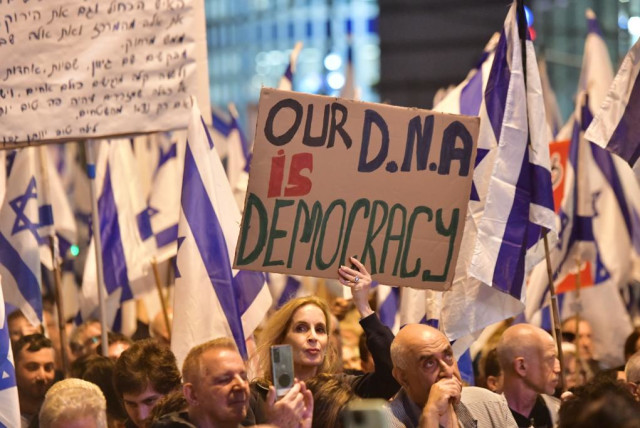Most Israelis think judicial reform compromise unlikely - poll

There was a slight increase in optimism regarding both the future of democratic rule in Israel and the future of national security.
Over 80% of Israelis think that it is unlikely that a compromise on the judicial reform will be reached between the coalition and opposition, according to the April 2023 Israeli Voice Index.
The survey, conducted by the Viterbi Family Center for Public Opinion and Policy Research, found that only 16% of Israelis think a compromise on the matter can be reached.
60% of coalition voters blamed the opposition and the protest movement for the lack of agreement, while 75% of opposition voters blamed the coalition. A small majority (53%) of respondents stated that they believe the protests will continue even if a compromise is reached.
Slight increase in optimism about Israel's future
Despite the pessimism about the likelihood of a compromise, there was a slight increase among respondents in optimism regarding both the future of democratic rule in Israel and the future of national security, although this still represented less than a third of the respondents.
There is a wide gap in the levels of optimism about the future of the state between Jews and Arabs, according to the survey, with just 14% of Arabs expressing optimism about the future of democratic rule and just 9% expressed optimism about national security.
There is also a wide gap in the levels of optimism between opposition and coalition voters, with optimism higher among coalition voters.
Slightly less respondents described Israel's overall situation as bad or very bad compared to the survey two months ago (a fall from 47% in February to 43.5% in April). Less than a quarter of respondents defined Israel's overall situation today as good or very good, the lowest share since the year after the Second Lebanon War.
The proportion of Arab respondents who described Israel's situation as good or very good was considerably lower (8%) than Jewish respondents (24%).
A noticeable difference was seen on this issue between men and women as well, with 31% of Jewish men expressing optimism about the situation in Israel compared to just 18% of Jewish women and 14% of Arab men compared to just 2% of Arab women.
Israelis across the board concerned about rise in violent crime
The survey additionally asked respondents about the rising levels of violent crime in recent months, finding that an increasing number of Israelis are concerned that they or a family member will be a victim of violent crime in an area where they live.
Among Arab respondents, older respondents expressed greater concerns of being victims of violent crime compared to younger respondents, while among Jewish respondents the opposite was true.
Respondents were also asked if they believe the police deals with crime in Jewish areas more thoroughly than it deals with crime in Arab areas, with 71% of Arab respondents saying they believe so and 55% of Jewish respondents saying the same.
Jerusalem Post Store
`; document.getElementById("linkPremium").innerHTML = cont; var divWithLink = document.getElementById("premium-link"); if (divWithLink !== null && divWithLink !== 'undefined') { divWithLink.style.border = "solid 1px #cb0f3e"; divWithLink.style.textAlign = "center"; divWithLink.style.marginBottom = "15px"; divWithLink.style.marginTop = "15px"; divWithLink.style.width = "100%"; divWithLink.style.backgroundColor = "#122952"; divWithLink.style.color = "#ffffff"; divWithLink.style.lineHeight = "1.5"; } } (function (v, i) { });

